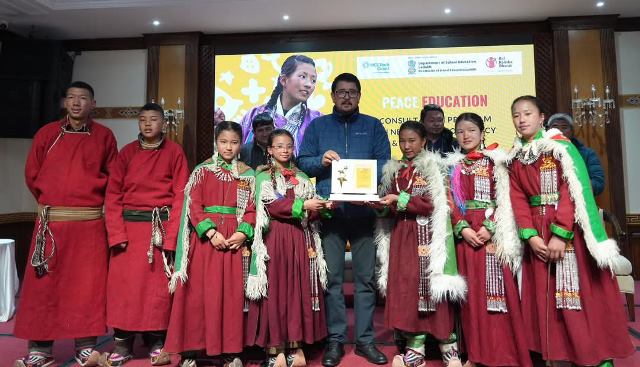District-Level Consultation on Peace Education Highlights Student Voices and Cultural Heritage in Leh
31/03/2025

Leh, March 31 (KIP)-A District-Level Consultation on Peace Education, organized by Bal Raksha Bharat, brought together educators, students, and leaders at Hotel Grand Dragon, Leh, to discuss the transformative role of peace-building initiatives in schools. The event emphasized the importance of fostering peace education and student-led initiatives to create inclusive and harmonious learning environments.
The event was graced by the presence of Hon’ble Chairman/CEC, LAHDC Leh, Adv. Tashi Gyalson, as the chief guest, and Hon’ble Deputy Chairman, LAHDC Leh, Tsering Angchuk, as the guest of honor. Also present were Director of School Education, Ladakh, Tsering Paldan; Director of Social Welfare, Ladakh, Tashi Dolma; State Head of Bal Raksha Bharat, Sharif Bhat; CEO Leh, Sonam Wangchuk; CEO Kargil, Sonam Dorjey; Principal DIET; Children Group Members Nurboo Dadal, Rigzin Dolker, and Karan Tawang; Head of Skara Yokma School, Taeva Bahrami; Former GO President of High School Chumathang, Rigzin Dolker; and Facilitator and Panel Moderator, Cheetan Angchuk. Representatives from the CEO Leh Office, DIET Leh, and school principals also participated in the discussions.
The consultation began with a welcome speech by Sharif Bhat, State Head of Bal Raksha Bharat, Ladakh, who introduced the organization’s ongoing efforts in peace education. Nurboo Dadul, a Children Group Member, spoke about the significance of student groups in schools and their role in addressing children’s concerns. Ms. Tsewang Dolma reflected on the progress and impact of the ongoing peace education project. A student representative shared their personal experience as a member of a children’s group, emphasizing how these initiatives have positively influenced the school community. Director of School Education, Ladakh, Tsering Paldan, also addressed the gathering, reinforcing the administration’s commitment to integrating peace education into the school system.
A cultural performance by students of Government High School Chumathang showcased Ladakh’s rich traditions through music and dance, reinforcing the region’s heritage while celebrating the spirit of peace and unity. The consultation also featured a panel discussion on the New Education Policy and National Education Framework, where insights were shared by CEO Leh, Principal DIET Leh, and representatives from Bal Raksha Bharat. The discussion sparked meaningful conversations on practical strategies for integrating peace education into school curricula.
Hon’ble Deputy Chairman, LAHDC Leh, Tsering Angchuk, also addressed the gathering, highlighting the significance of peace education in shaping a more compassionate and understanding society. He underscored the role of schools in fostering an environment where students feel safe, supported, and encouraged to develop critical thinking and emotional intelligence. He further stressed the need for collaborative efforts between educators, parents, and policymakers to ensure that peace education becomes an integral part of the academic framework.
To recognize contributions toward peace education, mementos were presented to the Chief Guest, Guest of Honour, and other distinguished guests, followed by certificates of appreciation awarded to headmasters of intervention schools and student leaders for their dedication to promoting peace-building initiatives.
CEC, while addressing the gathering, highlighted that the National Education Policy (NEP) is designed to ensure the overall growth and well-being of students, with a strong focus on effective implementation. He emphasized the importance of peace education, stating that in today’s fast-paced world, students often face high levels of stress and must be equipped to understand and manage their emotions. He stressed that their safety, well-being, and holistic development must remain a priority. Acknowledging that students sometimes struggle with challenges, he underscored the need for a robust education system that fosters continuous learning and provides the necessary support mechanisms. He further added that education should not be limited to training sessions but should lay a strong foundation for lifelong learning, emotional resilience, and personal growth.
The consultation concluded with a collective vision for the future, reaffirming the role of schools as spaces for nurturing peace, empathy, and mutual respect among students.